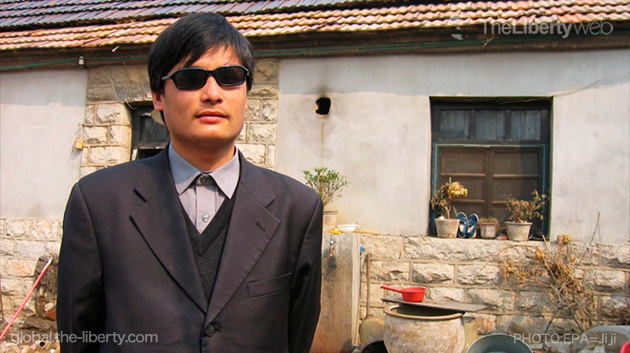Religion is the Last Stronghold of Freedom
-Chief Editor's Column, July 2012 Issue
Blind civil rights activist Chen Guangcheng. When he was under house arrest, his home was surrounded by a team of several hundred guards. / Photograph:EPA=Jiji
Blind civil rights activist Chen Guangcheng’s dramatic escape was yet another instance of the Chinese Communist Party’s human rights abuses against the Chinese people.
In 2006, Chen exposed the truth about government enforced abortions in China. After he was released from prison, he was placed under house arrest, but in the darkness of night, he escaped, broke a bone in his foot, and crawled across the ground to get away from surveillance and captivity.
Several hundred guards had been surrounding Chen’s home, and committed violent acts against him and his family on a daily basis. This must have cost the Chinese government several million dollars per year.
Just then, in May, the World Uyghur Congress (WUC), an organization from the Chinese autonomous Xinjiang Uyghur region, was holding its general assembly in Tokyo. Starting in March this year, civil servants, teachers, and pensioners in the Uyghur region had to sign promissory letters declaring that they embraced no religious faith, or else they would lose their jobs or receive no more pension money. Also, people in the Uyghur region are located using their cell phone numbers, and if more than four people “assembled” in one place, the police would clamp down on them.
The Chinese government calls such activities “security enforcement”, and allocates a budget more than 10 billion dollars a year to them – more than its national defense budget. This is how much energy the Chinese Communist Party uses in order to maintain its gigantic police state.
My homeland is a prison – it is like hell
Ilham Mahmut, the WUC’s representative in Japan said “The Uyghur region is our home, but it is also a prison. It is like hell.”
The religious backbone of the organization that fights for the freedom of the Uyghur people is Islam. In Tibet, another autonomous region of China, the protest movement centers on Buddhists, and since 2009, more than 30 Tibetan Buddhist monks have burned themselves to death.
Religions have a long history fighting political oppression.
The Roman Catholic church made a compromise with the Nazis. It was unable to stop the holocaust but protected Jews within the Vatican. A Protestant German pastor established a church independent of Nazi ideology, tried to plan Hitler’s assassination, and was finally executed.
A Japanese diplomat Chiune Sugihara, who was a pious Russian Orthodox man, acted contrary to the Foreign Ministry’s orders, and issued visas to Jews, thus saving approximately 6,000 people’s lives. His explanation was this: “I cannot throw away the lives of people who rely on me. If I did, it would amount to turning my back to God.”
Religious people have repeatedly sacrificed themselves to stand up to violent regimes in the past. At the root of their beliefs about human rights is the faith that all human beings are created by God, and every child of God is precious.
Religion is the last stronghold of freedom, and the same is true in China.
Premier Wen Jiabao worried about a “Dynastic Revolution”
The fall of Bo Xilai, former CPC Chongqing Committee Secretary, brought the corruption rampant among Communist leaders in China to the attention of the international community. The case is still being investigated, but as of today, it appears that Bo and his wife secretly transferred 6 billion dollars to foreign countries.
The entire secret funds of the party officials who absconded abroad in the past 10 years, are thought to amount to a sizable sum between 100 and 200 billion dollars. Most of this is thought to have been obtained by expropriating farmers’ land and pocketing the profits.
Premier Wen Jiabao expressed his worries following the government change in Chongqing like this: “The biggest danger for the ruling party is corruption. If we cannot solve this problem, the administration will have to start acting differently.” What he is afraid of is the proverbial “dynastic revolution” brought about by Heaven once a ruler loses his virtue.
Since last year, the Arab Spring movement has inspired people to make good use of modern networking opportunities. Since then some Chinese people post on Twitter suggesting that after the Arab Spring, China will be the next country to experience a major revolution. These have been deleted, and many Chinese accounts have been closed. But the corruption rampant among the Communist Party of China is coming to light more and more clearly, and the countdown for“the Chinese Spring”has started.
Religion crucial for revolution?
Looking at Chinese history, religion has often played a major part in dynastic revolutions.
The Three Kingdom Period began with the Yellow Turban Rebellion overthrowing the late Han. The Yellow Turbans were followers of The Way of Supreme Peace, a Taoist religious sect that specialized in healing people. The Red Turban Rebellion that occurred at the end of the Yuan Dynasty was a peasant uprising predominantly comprised of followers of the Maitreya Bodhisattva Sect of Buddhism from whose rows Zhu Yuanzhang rose and became the Hongwu Emperor of the Ming Dynasty. The Boxer Rebellion that weakened the Qing was a Buddhist anti-Western movement.
The proverbial “dynastic revolution” is “the world set right through the Will of Heaven”, so it is most obvious that religion should play a major role in it.
On June 2nd, the movie “The Final Judgement” was released in Japan, which predicts that in the near future, due to the efforts of religious leader, Japan will be able to withstand a dangerous totalitarian neighbor state’s invasion, and freedom will be established in both countries.
I pray from the bottom of my heart that the “dynasty” in the country that treats people nothing but a corrupt government’s tool and neglects their human rights, will change, and that in future, freedom will be established in China.
Jiro Ayaori



















